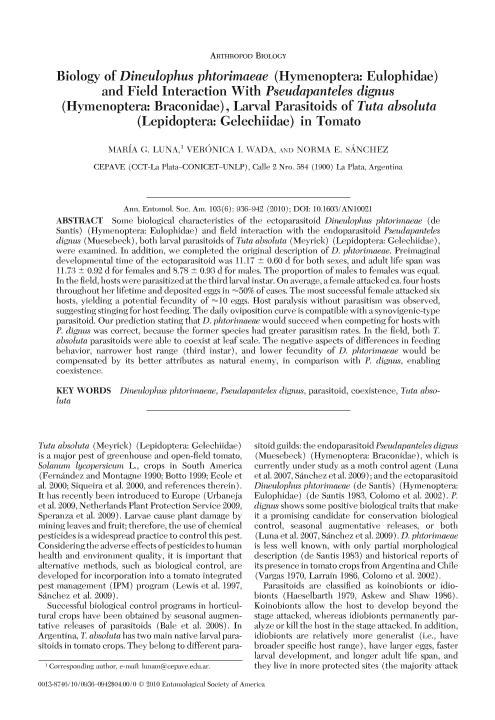Artículo
Biology of Dineulophus phtorimaeae (Hymenoptera: Eulophidae) and Field Interaction with Pseudapanteles dignus (Hymenoptera: Braconidae), Larval Parasitoids of Tuta absoluta (Lepidoptera: Gelechiidae) in Tomato
Fecha de publicación:
12/2010
Editorial:
Entomological Society of America
Revista:
Annals of the Entomologycal Society of America
ISSN:
0013-8746
Idioma:
Inglés
Tipo de recurso:
Artículo publicado
Clasificación temática:
Resumen
Some biological characteristics of the ectoparasitoid Dineulophus phtorimaeae (de Santis) (Hymenoptera: Eulophidae) and Þeld interaction with the endoparasitoid Pseudapanteles dignus (Muesebeck), both larval parasitoids of Tuta absoluta (Meyrick) (Lepidoptera: Gelechiidae), were examined. In addition, we completed the original description of D. phtorimaeae. Preimaginal developmental time of the ectoparasitoid was 11.17 ± 0.60 d for both sexes, and adult life span was 11.73 ± 0.92 d for females and 8.78 ± 10.93 d for males. The proportion of males to females was equal. In the field, hosts were parasitized at the third larval instar. On average, a female attacked ca. four hosts throughout her lifetime and deposited eggs in 50% of cases. The most successful female attacked six hosts, yielding a potential fecundity of_10 eggs. Host paralysis without parasitism was observed, suggesting stinging for host feeding. The daily oviposition curve is compatible with a synovigenic-type parasitoid. Our prediction stating that D. phtorimaeae would succeed when competing for hosts withP. dignus was correct, because the former species had greater parasitism rates. In the Þeld, both T. absoluta parasitoids were able to coexist at leaf scale. The negative aspects of differences in feeding behavior, narrower host range (third instar), and lower fecundity of D. phtorimaeae would be compensated by its better attributes as natural enemy, in comparison with P. dignus, enabling coexistence.
Archivos asociados
Licencia
Identificadores
Colecciones
Articulos(CEPAVE)
Articulos de CENTRO DE EST.PARASITOL.Y DE VECTORES (I)
Articulos de CENTRO DE EST.PARASITOL.Y DE VECTORES (I)
Citación
Luna, María Gabriela; Fadiya, Oluwadamilola Victoria; Sanchez, Norma Elba; Biology of Dineulophus phtorimaeae (Hymenoptera: Eulophidae) and Field Interaction with Pseudapanteles dignus (Hymenoptera: Braconidae), Larval Parasitoids of Tuta absoluta (Lepidoptera: Gelechiidae) in Tomato; Entomological Society of America; Annals of the Entomologycal Society of America; 103; 6; 12-2010; 936-942
Compartir
Altmétricas




